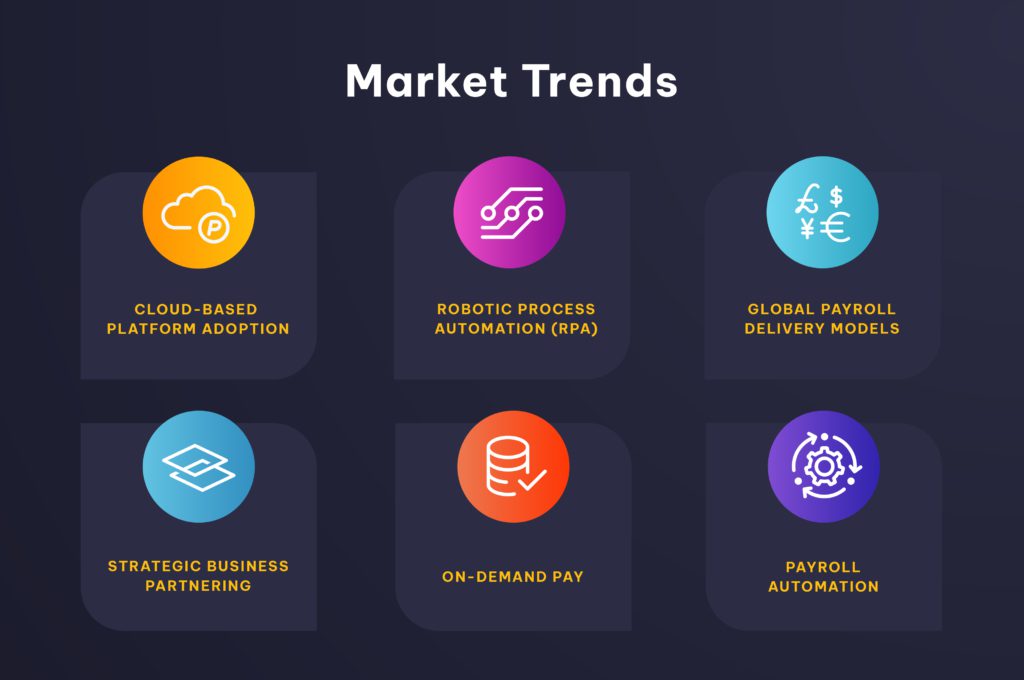Global Payroll Transformation: Taking a Practical Approach

Claire Ryan
UKG Inc., a leading provider of HR, payroll, and workforce management solutions announces entering into a definitive agreement to acquire Immedis. Read More

The past two years have been a wake up call for many businesses. The challenges of the pandemic have shown that older ways of handling payroll and HCM are no longer sufficient to pay employees. Global payroll needs to transition into the 21st century, and businesses need to follow a practical approach in making their transformation.
Global payroll providers have the opportunity to shift from being merely information processors to a larger role of strategic advisors or partners to businesses. To that end, modern data technology can provide valuable insights. The best strategy is to use an integrated platform to carry out every needed feature.
We will discuss the challenges of payroll in the future, and how global payroll services are adapting to meet them:
Our research suggests that most businesses have outdated and inefficient payroll systems. Only 28% of businesses have access to real-time dashboards indicating payroll data. Almost 45% have very low to limited levels of standardization across global payroll processes. And on average, businesses surveyed used 7 different payroll providers. They could reduce that number to 1 by switching to a global payroll provider.
Businesses face challenges and need improvement in several areas:
Despite these challenges, businesses are pivoting towards new options.
Payroll transformation is a top priority amongst buyers, with most requiring assistance in navigating and enabling transformative outcomes. We carried out a survey of business owners to determine where they see their payroll needs currently changing.
Clearly, there is room for improvement across the board. But our research also shows that the vast majority of business owners are aware of this, and are beginning steps to make their own payroll transformation.
We have identified several current market trends shaping the face of global payroll.

Cloud-based platform Adoption allows payroll to be enabled through HR and payroll technology platforms.
Robotic Process Automation (RPA) transforms routine office payroll tasks into automated programs.
Global Payroll Delivery Models integrates global payroll into one delivery system, allowing users to manage different regulatory requirements across countries.
Strategic Business Partnering makes payroll into a COE. In particular, executives can incorporate payroll into expansion plans earlier in strategic corporate discussions.
On-Demand Pay empowers workers by giving them more flexible payment options. Paying employees when they want to be paid promotes company loyalty.
Payroll Automation provides several benefits, including improving compliance, saving time and money, strengthening security, delivering data analytics, and realizing the value of HCM.
Digitization will transform payroll operations from simple processing tools to a strategic COE (Center of Excellence). This will enable greater agility and resilience in navigating volatility, supporting strategic plans, and creating global payroll solutions. Payroll continues to be a critical, core element in improving the employee experience. It must promote trust through timely, accurate, transparent results and guided insights.
Mobile first, if not mobile only, UI /UX expectations will escalate. People already expect to do everything on their phones, and payroll is no exception.
AI/ML will augment practitioners and employees with guided, predictive insights and decision making. This will create consistent payroll outcomes and improve data quality.
Demand for alternative payment methods will escalate. Already, a number of digital options exist, and some businesses are even exploring crypto payment methods.
Employer integrated earned wage access for on-demand payroll will become a standard payment option expected of employers. Post-2020, people are used to on-demand transportation, entertainment, and delivery. Payroll will be treated no differently.
Navigating intensifying compliance directives globally will remain a top challenge. Firms of all sizes will increasingly see their footprints pulled into new countries of operation, and the complexity of their legal needs will grow rapidly. International payroll services are necessary for managing international employees and a global workforce.
Payroll operating models will require modern capabilities to scale, remain agile, and navigate future volatility. Manual data entry and manipulation is simply too slow, and takes valuable time away from work. Automation, on the other hand, will enable practitioners to focus on value-added tasks.
Globally consolidated, predictive analytics reporting will be a standard, integral tool for leveraging the rich data sets that payroll holds. They will enable users to discover insights in employee data, identify bottlenecks, and streamline their overall payroll process.
Together, these needs will transform payroll services from simple processing operations into a strategic COE and advisor to the business and to HR.

Modern payroll services require a platform-based approach, incorporating technology, services, and extended integrated capabilities through a single global solution. Because no single feature suffices to modernize payroll, suitable systems will require a platform that can handle dozens of new features. Some of the most relevant features include:
Clearly, this is not a challenge for a single piece of software. Each business will have its own set of needs, which will likely include some subset of the features listed above. That’s why a flexible platform, with a 3rd party API marketplace, is the best option for businesses. Flexible platforms allow businesses to operate the core of their payroll while also choosing which specific applications to integrate to meet their unique needs.
Dozens of features fit together to meet the growing needs of payroll and HCM in the 21st century. The worst way to accomplish this is to try to solve all problems one by one, with separate pieces of software that need to be carefully integrated by hand. Unfortunately, many businesses go this route, only to waste time and money and introduce errors and security risks to their system.
The best way to transform payroll to solve modern problems is to use a single, integrated platform. This approach allows data to be shared across applications, allowing users to manage their tasks with flexibility. Businesses can pick and choose the individual APIs they need and plug them into their system without having to worry about whether or not they will work.
Immedis is a global payroll provider that offers a fully integrated global payroll solution. Through a combination of automation, digitalization, and predictive insights, our platform allows payroll and HR managers to turn payroll into a valuable tool for managing workers and ensuring compliance with domestic and foreign employees alike.
Immedis Blog





